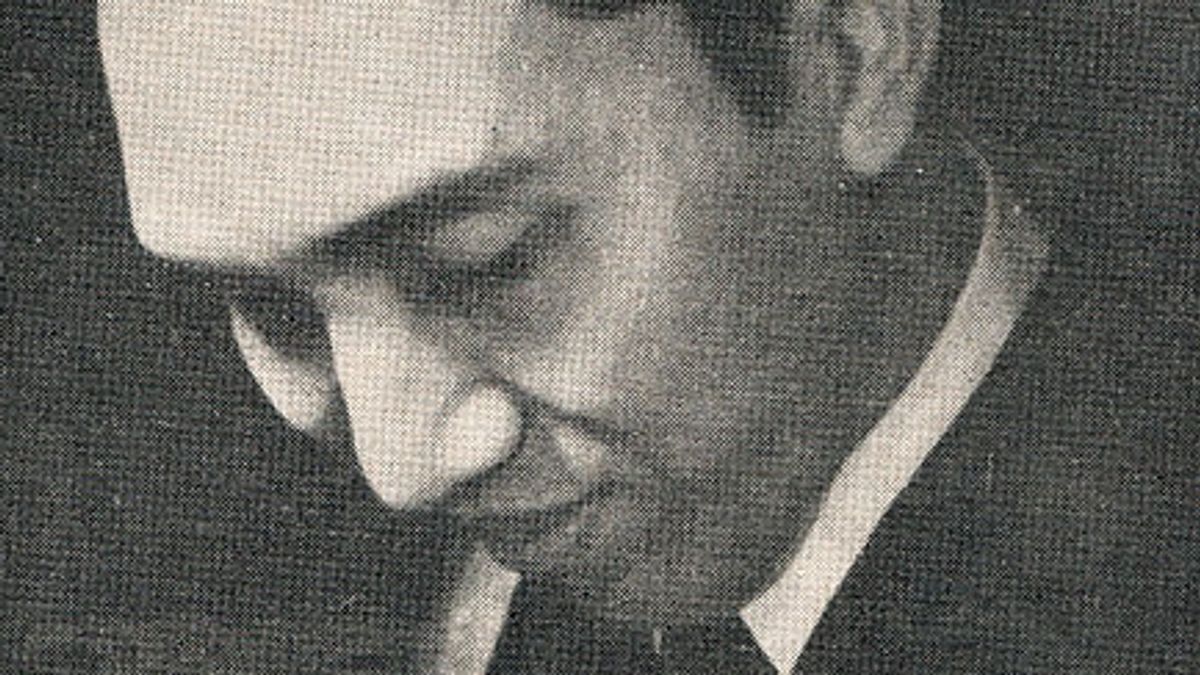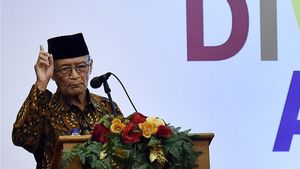JAKARTA - Rosihan Anwar's footsteps as a film critic in the country cannot be underestimated. His scathing criticism often makes the ears of filmmakers hot. Even since Rosihan Anwar became the longest serving Indonesian Film Festival (FFI) jury. The criticism caused an uproar for the 1977 FFI event. Rosihan Anwar called Indonesian filmmakers a dream trader. For the sake of selling films, all means are taken, including making a poor quality film narrative that is dominated by elements of luxury, crime, and sex.
During his lifetime, Rosihan Anwar was a multitalented figure. He is known as a journalist, writer, historian, humanist, actor and many more. In fact, he has practiced this profession across ages, from the Japanese colonial era, the era of independence, the Old Order, the New Order, and the Reformation. In the world of acting as well. His meeting with Usmar Ismail while studying at a high school, Algemeene Middelbare School (AMS), Yogyakarta became his estuary. The activities of both of them as theater players paved the way into the world of cinema.
After Indonesia's independence, a love for the world of acting made Rosihan and Usmar Ismail founded the first film production company in Indonesia, Perfini on March 30, 1950. Since then Usmar Ismail has strengthened his career as a director. While Rosihan Anwar still chooses to be active as an actor. Rosihan Anwar then actively acted in every film directed by Usmar Ismail who would later be known as the Father of Indonesian Film.
“Speaking of Rosihan and the film, it should be noted that the senior journalist is also a film actor, although he has never played a major role. In the 1950s in Usmar Ismail's films, Rosihan's face could almost always be found. Rosihan was indeed a friend of Usmar Ismail's school in Yogyakarta before the war. After Indonesia's independence, Usmar and Rosihan became a close family because their wives were siblings."

“In the 1970s and 1980s, we still often saw Rosihan's face in cinemas. As I recall, Rosihan last appeared in the film Cut Nyak Dhien (1989) directed by Eros Djarot with Christine Hakim as the main character. The film had the honor of being shown at one of the sections of the Cannes Film Festival in Cannes, Southern France. Rosihan and I were invited to accompany the film to Cannes,” said Salim Said in his book From Gestapu to Reformation: A Series of Testimony (2013).
Not only as an actor, Rosihan Anwar then challenged himself to work on a series of historical themed documentaries. The production of the film was established in collaboration with Rosihan Anwar and the then Director of TVRI, Ishadi. One of the films is a full story about the relics of Portuguese and Dutch buildings in Malacca. Moreover, Rosihan Anwar has added to his role in the film industry by actively writing the script for a documentary film titled Pikatan Kayu Cendena which tells the story of the history of East Timor.
"Besides being active and following the development of the Indonesian film industry since 1950, Rosihan is also active in making documentaries and reportage films for TVRI," wrote Anita K.
Hot criticism in FFI 1977After that, Rosihan Anwar's love for the Indonesian film industry grew. Rosihan began to take on a new role again. The senior journalist chose to become a film critic. His criticism has grown louder since Rosihan Anwar was elected as one of the jury in organizing FFI. Not for a moment, Rosihan held the mandate as a jury for 11 years or from 1976 to 1991. As a result, criticism often caused a stir in the organization of FFI. Including when he was a judge at FFI 1977.
The uproar of FFI 1977 was started by the habit of the jury who often read out their judgments about Indonesian films. Incidentally at that time, the 1977 FFI Jury Chair Djaduk Djojokusumo was a bit unwell. Therefore, Rosihan Anwar took over the reading of the assessment and stated that the jury's decision at the 1977 FFI was that no film won the best film award. Rosihan also considered Indonesian filmmakers at that time to be dream traders, not creative people. This decision immediately inflamed hatred towards FFI organizers, especially Rosihan Anwar.
“The 1977 FFI jury judged that Indonesian films did not have an Indonesian face, but had a Mandarin or Indian face. It features luxuries, created by producers who sell dreams and are therefore called dream merchants. In 1977 no film was selected as the best film. No Citra Trophy awarded.”

From the front: Djamaluddin Malik and Usmar Ismail. From behind: Rosihan Anwar, Nazir Naib, and Djajakusuma (Source: Wikimedia Commons)
“The film people who were present at the ceremony were angry and emotional. Up in arms. Actor Sophan Sophiaan and producer Mrs. Samantah immediately asked me: Can you make a film? Her husband, actor Ratno Timur, said angrily: dung. Jury member Salim Said was surrounded. The angry people did not beat him because they were protected by his friends from Makassar," said Rosihan Anwar in his own book, Small History "Petite Histoire" Indonesia Volume 3 (2009).
It is not without reason that Rosihan Anwar gave such an assessment. In his view, filmmakers act with a merchant's perspective. As a result, the resulting film is only based on the principle of profit and loss. Not creativity. That's why there are many films that contain elements of luxury, violence, and sex as their main teachings. To sell he said. As a result of the chaos, at the next FFI the jury was no longer allowed to read out their assessments. This situation lasted more than 10 years.
Although many initially called Rosihan Anwar's criticism baseless, slowly many people agreed with his opinion. Humanist Ajib Rosidi, one of them. Ajib Rosidi, who sat on the chair of the 1978 FFI jury, felt what Rosihan Anwar felt. Many of the films that Ajib Rosidi watched were said to be of poor quality.
“By the 1978 FFI committee I was asked to sit as a member of the jury. Although I have loved watching movies since I was young and have also written several criticisms about the films I have watched, my activities never intersect with the world of film. Maybe I was asked to be a jury member because the committee saw me as the chairman of the Jakarta Arts Council (DKJ). I received the honor. What I remember is that the other jury members were H. Rosihan Anwar, who seemed to have become the jury's inventory because he was appointed every year. And being on a film jury is not what I thought it would be. A lot of time is wasted watching poor quality films,” concluded Ajib Rosidi in his book Life Without a Diploma (2008).
*Read other information about FILM or read other interesting articles from Detha Arya Tifada.
Other MEMORIESThe English, Chinese, Japanese, Arabic, and French versions are automatically generated by the AI. So there may still be inaccuracies in translating, please always see Indonesian as our main language. (system supported by DigitalSiber.id)









